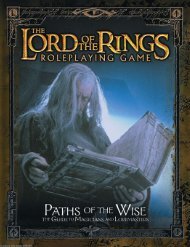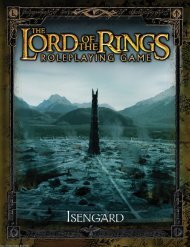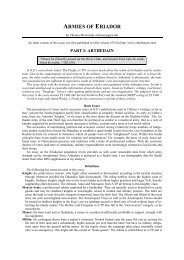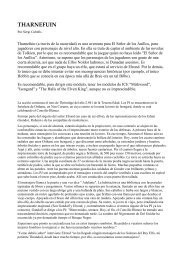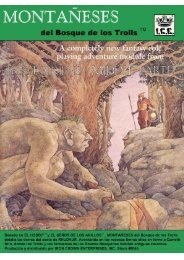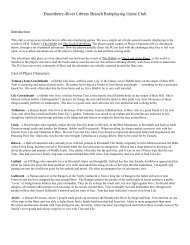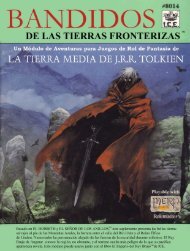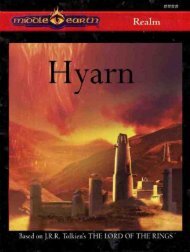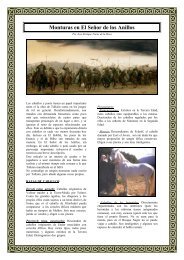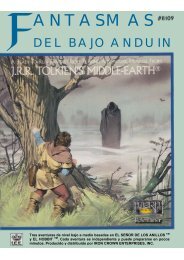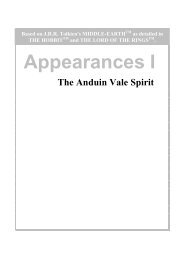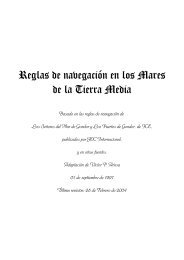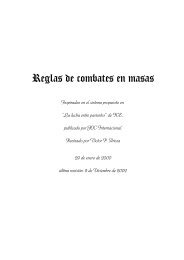Vinyar Tengwar 39 - Fan Modules - Free
Vinyar Tengwar 39 - Fan Modules - Free
Vinyar Tengwar 39 - Fan Modules - Free
You also want an ePaper? Increase the reach of your titles
YUMPU automatically turns print PDFs into web optimized ePapers that Google loves.
————————————— <strong>Vinyar</strong> <strong>Tengwar</strong> <strong>39</strong> (July 1998) ———————————<br />
Author’s Notes to the Ósanwe-kenta<br />
Note 1<br />
Here níra (“will” as a potential or faculty) since the minimum requirement<br />
is that this faculty shall not be exerted in denial; action or an act of will is<br />
nirme; as sanwe “Thought” or “a thought” is the action or an act of sáma.<br />
Note 2<br />
It may be occupied with thinking and inattentive to other things; it may be<br />
“turned towards Eru”; it may be engaged in “thought-converse” with a third<br />
mind. Pengolodh says: “Only great minds can converse with more than one<br />
other at the same time; several may confer, but then at one time only one is<br />
imparting, while the others receive”.<br />
Note 3<br />
“No mind can, however, be closed against Eru, either against His<br />
inspection or against His message. The latter it may not heed, but it cannot say<br />
it did not receive it”.<br />
Note 4<br />
Pengolodh adds: “Some say that Manwë, by a special grace to the King,<br />
could still in a measure perceive Eru; others more probably, that he remained<br />
nearest to Eru, and Eru was most ready to hear and answer him”.<br />
Note 5<br />
Here Pengolodh adds a long note on the use of hröar by the Valar. In brief<br />
he says that though in origin a “self-arraying”, it may tend to approach the<br />
state of “incarnation”, especially with the lesser members of that order (the<br />
Maiar). “It is said that the longer and the more the same hröa is used, the<br />
greater is the bond of habit, and the less do the ‘self-arrayed’ desire to leave it.<br />
As raiment may soon cease to be adornment, and becomes (as is said in the<br />
tongues of both Elves and Men) a ‘habit’, a customary garb. Or if among<br />
Elves and Men it be worn to mitigate heat or cold, it soon makes the clad body<br />
less able to endure these things when naked”. Pengolodh also cites the opinion<br />
that if a “spirit” (that is, one of those not embodied by creation) uses a hröa for<br />
the furtherance of its personal purposes, or (still more) for the enjoyment of<br />
bodily faculties, it finds it increasingly difficult to operate without the hröa.<br />
The things that are most binding are those that in the Incarnate have to do with<br />
the life of the hröa itself, its sustenance and its propagation. Thus eating and<br />
drinking are binding, but not the delight in beauty of sound or form. Most<br />
binding is begetting or conceiving.<br />
“We do not know the axani (laws, rules, as primarily proceeding from Eru)<br />
that were laid down upon the Valar with particular reference to their state, but<br />
it seems clear that there was no axan against these things. Nonetheless it



